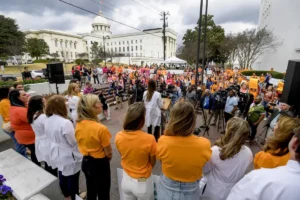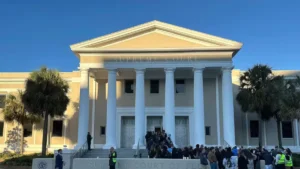Introduction
The recent ruling in Alabama, where frozen embryos are now legally classified as children, has significant political implications. This decision affects many couples hoping to start families through fertility treatments, as it puts a halt on certain procedures. It emphasizes state supreme court races’ importance, as they shape legal interpretations and directly impact people’s lives. Beyond reproductive rights, this ruling also highlights how judicial decisions shape societal norms and values. As voters participate in state elections, the outcome of these races could deeply influence the country’s legal framework and political conversations.
Legal Expert’s Insight: Political Implications
Jesse Hill, a law professor at Case Western Reserve University School of Law in Cleveland, stated, ‘This is where the action is.’ The Alabama Supreme Court’s decision on February 16th to legally recognize frozen embryos created through IVF as children has unexpectedly propelled IVF into a contentious issue in electoral campaigns, revealing significant political implications.
Alongside concerns of military allegations or punitive damages, there is pressure on the GOP-controlled legislature to address the halting of fertility treatments by multiple providers in the state, underscoring the political implications of the Alabama IVF ruling. Following the U.S. Supreme Court’s termination of Roe v. Wade in 2022 and the removal of federal protections for abortion rights, these decisions have initiated legislative efforts from states to cases that have already ended up before state supreme courts, further highlighting the political landscape surrounding reproductive rights.
Judicial Influence Reminder
Hill remarked, ‘Many people may not realize that state supreme courts have such direct influence on their everyday lives,’ emphasizing, ‘But Alabama’s decision serves as a reminder that these courts hold significant power, particularly now, over people’s rights,’ highlighting the political implications of judicial rulings.
This year’s elections will see 80 races for Supreme Court seats across 33 states, including battlegrounds like Michigan, Ohio, and West Virginia, where partisan control is at stake. At least four states will hold state supreme court races on Super Tuesday, including Alabama, Arkansas, North Carolina, and Texas, further emphasizing the political significance of these judicial contests. Others, including Idaho, Illinois, Kentucky, Ohio, Oregon, and West Virginia, will have contests by spring.
Alabama Supreme Court

In Alabama, all five Republican Supreme Court seats are up for vote, signaling significant political implications. Chief Justice Tom Parker, 72, cited biblical sources in the IVF case but is ineligible for reelection due to age restrictions in Mississippi. Since Roe Dobbs v. Jackson Women’s Health Organization, nearly 40 cases challenging abortion restrictions have emerged in 23 states, highlighting the political stakes. According to the Center for Reproductive Rights, 30 state supreme courts have tackled abortion cases, with varying outcomes, underscoring the divisive political nature of these rulings.
Abortion Rulings Impact
Efforts to overturn abortion rulings have significant political implications for those seeking reproductive care. In December, the Texas Supreme Court’s decision to end abortion access prompted national debate. Douglas Keith of the Brennan Center for Justice notes how state supreme courts often play a pivotal role in key issues, like abortion rights, as the US Supreme Court steps back. Keith emphasizes that recent decisions, like Dobbs’s, highlight the growing influence of state courts in shaping fundamental rights amid the federal court’s reluctance. Political implications are evident as state courts navigate pivotal issues while the federal court’s stance evolves.
Nevada Abortion Petition
The ruling in Nevada carries significant political implications as it allows for the collection of signatures on a petition to measure abortion rights, despite opposition from anti-abortion groups. Nevadans for Reproductive Freedoms’ appeal to the Nevada Supreme Court underscores the political stakes. Similarly, efforts in Arizona to place abortion rights on the ballot face challenges, given the conservative composition of the Supreme Court. Professor Brian Fitzpatrick highlights the political power of state supreme courts in shaping direct democracy by determining what questions make it to the ballot.
State Courts’ Key Role

State courts’ role in ballot initiatives holds significant political implications, especially as groups push for abortion rights initiatives in multiple states this year. Decisions from Florida, Missouri, and Nevada state supreme courts are anticipated. In January, Florida’s Republican Attorney General sought to keep abortion rights amendments off the ballot. An appellate court found Secretary of State Jay Ashcroft’s summary biased in Missouri. The Missouri Supreme Court’s denial of Ashcroft’s appeal underscores the political stakes involved in state court rulings on contentious issues like abortion.
Ohio Abortion Initiatives
The efforts to overturn abortion rights through ballot initiatives in Ohio and elsewhere hold significant political implications, especially after voters endorsed adding abortion rights to the state constitution last year. Despite voter approval, Ohio’s Supreme Court will ultimately determine the interpretation of constitutional amendments and their impact on existing abortion laws. Professor Hal Werner underscores the importance of state Supreme Court races this year, emphasizing their critical role in shaping not only abortion rights but also other key issues like contraception, environmental protections, and criminal justice.
Court Control Shift
The upcoming election for three seats, coupled with the current 4-3 Republican majority, holds significant political implications, offering Democrats a chance to regain control of the court for the first time since 1986. The recent reversal by the Wisconsin Supreme Court on redistricting maps underscores the state’s political volatility, potentially tilting the legislative balance in favor of Republicans. Moreover, challenges to Wisconsin’s abortion ban could also land before the state Supreme Court, further accentuating the political stakes. According to Kyle Condic, managing editor of the University of Virginia’s Center for Politics newsletter, the redrawn lines in Wisconsin have already reshaped politics, highlighting the pivotal nature of these races.
Conclusion
The Alabama IVF ruling underscores the pivotal role of state supreme court races in shaping the legal landscape and impacting citizens’ lives. It serves as a stark reminder of the significant power wielded by these courts, especially amidst ongoing US elections. The ruling’s political implications are profound, shedding light on how state judicial decisions can influence reproductive rights and other contentious issues. As voters weigh their choices, the outcome of these court races could profoundly shape the nation’s legal trajectory and societal norms.
FAQs
- Why is the Alabama IVF ruling significant?
Ans: The ruling legally recognizing frozen embryos as children has profound political implications, particularly in the realm of fertility treatments.
- How does it relate to state supreme court races?
Ans: It highlights the pivotal role of state supreme court races in determining legal interpretations and shaping societal norms.
- What’s the connection to this year’s US elections?
Ans: The ruling underscores the importance of state courts in citizens’ lives, amplifying the significance of state supreme court races in this year’s US elections.
- Why should voters pay attention to state supreme court races?
Ans: These races hold the potential to significantly impact the nation’s legal landscape and political discourse, making them crucial for informed voting decisions.
- What are the broader implications of the ruling?
Ans: The ruling’s broader implications extend beyond reproductive rights, emphasizing the critical role of judicial decisions in shaping societal values and norms, with far-reaching political implications.
More info: James Biden GOP FBI